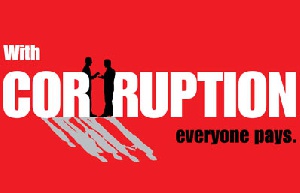A National Anti-Corruption Action Plan (NACAP) has been developed to combat corruption which is affecting the lives of the people, particularly the poor in society.
NACAP, designed to be implemented within a 10-year period, would help address the problem of corruption in a more strategic and co-ordinated manner, without accusing any political party or government.
The Commission on Human Rights and Administrative Justice (CHRAJ), which is leading the process and implementation of NACAP, on Wednesday engaged stakeholders at a forum to deliberate on the Plan and educate participants on actions needed to be taken by all to help fight corruption.
Participants also used the forum to review the draft Conduct of Public Officers Bill, initiated by the Government to guide the actions of public officers and ensure that they act in a manner of integrity while they serve the purpose of their office to the best of their capacity.
The development of the NACAP and the conduct for public officers’ bill is a step towards ensuring that Ghana becomes corruption-free.
Mr Dominic Cecil Hammond, Legal Officer at CHRAJ, who briefed participants on NACAP, said the Plan was developed against the background of the many challenges that confronted Ghanaians in the fight against corruption.
He said challenges including the politicisation of the fight against corruption, lack of public participation in the development and implementation of anti-corruption measures, weak political will to pursue corrupt officers as well as lack of capacity of media and society in fighting corruption were identified.
Therefore, further consultation recommended the need to build citizens capacity to “say no” to corruption by not engaging in corrupt practices as well as reporting corrupt officials, Mr Hammond said.
He said the need to build media capacity to condemn and fight corruption was also identified while the public and private sectors, parliament, civil society and religious groups had all been identified as critical partners in fighting corruption.
Mrs Linda Ofori Kwafo, Executive Secretary of Ghana Anti-Corruption Coalition, said the fight against corruption required collective but specific roles by government, parliament, judiciary, citizens, media and development partners among others to address the canker.
She, however, said the Government must lead the way in the fight while citizens must be empowered to demonstrate integrity and say no to vote buying, bribe giving, bribe taking and all forms of corrupt practices.
Mr Vitus Azeem, Executive Director, Ghana Integrity Initiative emphasised the need to make it impossible for people to engage in corrupt practices by putting in place adequate measures that would prevent people from squandering state funds.
“Governance is very important in the fight against corruption - government and anti-corruption goes hand-in hand”.
Regional News of Friday, 10 October 2014
Source: GNA













